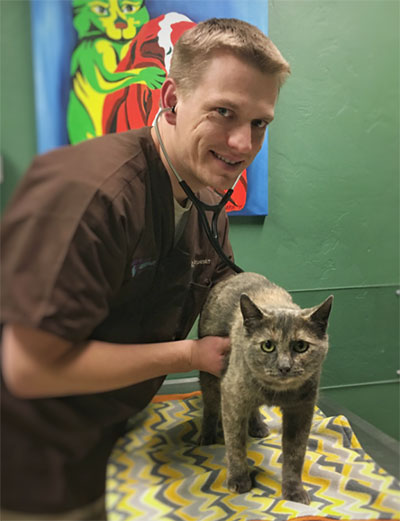


SERVICES
Feline Wellness Care

Nothing is more important to us than keeping our patients healthy. Preventative wellness care focuses on avoiding disease and monitoring for subtle changes before they become bigger problems.
There are many facets to preventative care -
Examination
Our veterinarians perform a full nose to tail exam at each wellness visit. They look for things such as body condition, dental health, lumps, bumps and changes from previous exams. This thorough physical allows them to catch and address problem areas to keep their patients healthy.
Vaccinations
Vaccinations help the body's immune system recognize and fight disease. There are "core" vaccines which are recommended for each patient, and "noncore" vaccines which are lifestyle based. Our staff recommends a customized vaccine protocol based upon your pet's overall risk to various diseases. Click on the vaccination below to learn more.Feline Distemper
Considered core, this combination vaccine covers for panleukopenia, which is often fatal, and other upper respiratory viruses that can make cats very sick.
Rabies
Required by most municipalities, the Rabies vaccine is important for all pets to prevent contraction of the virus and protect public health.
Leukemia
Considered noncore, cats that have known or potential exposure to leukemia positive cats should be vaccinated. Cats that spend time outdoors or those with family members who work in cat rescue are also at risk.
With the exception of the Rabies vaccine, the first time a pet is exposed to a vaccine, the body does not fully know what to do with the information. Pets, like people, need to have their initial vaccinations boostered within a 3-6 week time period. The body then identifies the vaccine and forms the appropriate protection. If a vaccine booster is missed, or goes beyond the recommended time window, the body may forget about the previous information and the vaccine series may need to be restarted to ensure full protection.
The benefits of easily preventing deadly diseases via vaccination far outweigh the potential risks. Reactions, while rare, do occur and are typically fairly mild. Our veterinarians customize vaccine recommendations and utilize the most up to date protocols to avoid unnecessary over-vaccination and keep the process as safe as possible for our patients.
Parasite Prevention
Parasites are organisms that live on or in another organism (your pet!), obtaining nourishment and protection with no benefit to the host. Parasites are very common, but also easily preventable. Many of these parasites are zoonotic, meaning they can be transmitted to human family members as well. For this reason our veterinarians follow the CDC recommendations and promote preventatives not just for the health of our patients, but for their families as well.
Please click the parasite below for more information.,Heartworm
Carried by mosquitoes, heartworms infect the blood system of pets. As heartworms grow, they mature in the heart and lungs and are life-threatening. Heartworm disease is prevented via a year-round monthly chewable.
Flea/Tick
Fleas and ticks are not just nuisances, they carry and cause disease as well. Flea allergy skin conditions and tick borne diseases are easily preventable via a variety of methods that are recommended year-round.
Internal Parasites
There are a number of intestinal parasites that pets, even indoor-only cats, are prone to getting due to their grooming behavior and eating habits. Often there are no symptoms of internal parasites, but that doesn't stop them from transmitting these infections to other pets and human family members. We recommend broad-range deworming a minimum of twice yearly, regular stool sample checks and continued heartworm preventatives which also offer some protection against some intestinal parasites.
Labwork Monitoring
There are a variety of parameters that we recommend monitoring regularly in our patients. These tests give us information about exposure to diseases and changes in overall body systems that allow us to appropriately manage and treat the pets we see.
Please click the lab below for more information.Feline Leukemia/FIV testing
Feline Leukemia and Feline Immunodeficiency Virus are serious viral diseases that are often spread to kittens by their mother or through direct contact with an infected cat. Cats with these diseases will have suppressed immune systems and knowing their status allows us to form better treatment plans for those patients.
Internal Parasite Testing
Most often, parasites will go unnoticed by pet owners as they do not like to leave the body. Typically pets are asymptomatic and rarely present themselves with the exception of immunocompromised patients or when there is such a high worm burden the body can no longer keep them in. Because of this, we recommend regular stool sample checks which allow us to look for parasite eggs under a microscope. This allows us to not only identify parasites, but also recommend treatment for specific parasites that standard broad-range deworming may not cover.
Bloodwork Screening
Annual bloodwork screening checks various parameters of red and white blood cells as well as organ function values. This screening not only establishes a useful baseline for your pet, but also helps us identify subtle changes and abnormalities before they present symptomatically.



